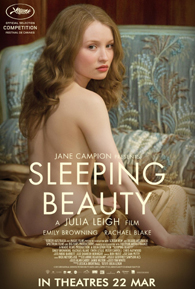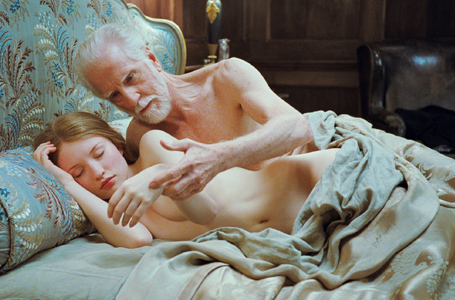
Lucy (Emily Browning) is a university student somewhere in Sydney who is using her body to make ends meet in more ways than one. Other than as a temp at an office, Lucy is also waitressing, being a test subject for medical experiments, and hangs around bars where she spends time either cockteasing her fellow male guests or bedding them (the movie never makes clear) when she comes across an ad in the paper for a specialty waitressing job that requires she parade around in lingerie alongside other young women (who are wearing even kinkier gear than she is) and service old to middle aged wealthy dinner guests. Before long, to earn even more keep she is drugged with tea and sleeps in a bed, where older man are allowed to ravish her to the extent that no penetration of any form is allowed.
As for anyone who wants to know what all this has to do with the fairy tale of Sleeping Beauty from which one of the most beloved of Disney films has sprung, the answer is actually none. The title has little to do with the fairy tale, but more to do with Japanese Nobel Prize winner Yasunari Kawabata's short story The House of the Sleeping Beauties where a similar task is given to some women. The great problem with this movie is also pretty much that possibly director Julia Leigh, while drawing inspiration from Kawabata's story (in another scene she references his novel The Master of Go), doesn't adequately convey, or seem to know, which is just the same given the consequences, where to exactly turn with the premise.
While David Lynch in Inland and Zack Snyder in Punch at least make attempts to create tension via the fact that the multiple lives of their heroines are seeping and coming into conflict with each other, the multiple lives of Lucy in this movie never really intersect or have an effect on the overall outcome of the story. Director Julia Leigh, who also wrote the screenplay, barely gives any of the characters a suitable or plausible motivation save two of the sexually frustrated geezers who use Lucy later on. In her mise-en-scene Leigh tries to approximate the austere, formalistic compositions of Kubrick, though using mostly wide to medium shots with only a few dramatic facial closeups.
Director Leigh is a first time and has so far been a novelist, and perhaps makes a fallacy that is made in directing when transferring from the page: on the page the nuances, motivations and implications can all be made clear whereas on the screen it often takes careful mise en scene and good acting to bring them across. The result is that Lucy may possibly be one of the most passive female leads in film history, a cipher speaking in repeated statements, and the movie basically consists of watching things happening to her while my mind kept expecting some giant samurai or Polish gangsters to drop in just to liven up the proceedings a little.
Sleeping Beauty is a tone-deaf little movie about a girl using her body to make ends meet. Don't ask me what it's really about because the movie doesn't even seem to have a clear idea of that itself.

